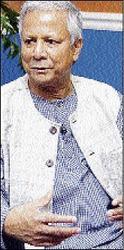John Myers Jr., Senior Business Reporter

Professor Muhammad Yunus, chief executive officer of the Grameen Bank and 2006 Nobel Prize laureate. - Rudolph Brown/Chief Photographer
Grameen Bank's founder and chief executive officer, Professor Muhammad Yunus, has urged local financial institutions to adopt a social banking policy similar to that which the Bangladesh-based entity has mastered in providing funds for the poor to establish small and micro businesses.
No less capable
Speaking at the fifth annual Scotiabank Jamaica lecture series, held yesterday at The Jamaica Pegasus hotel in New Kingston, Yunus said the poor were no less capable of becoming successful entrepreneurs than anyone else.
In his address to the wide cross section of representatives from Jamaica's business and banking sectors, academia and Government, the Grameen Bank founder said, "We need to fix the system so the people do not
remain poor."
Yunus, who was awarded a Nobel Peace Prize in 2006 for his highly successful and unconventional banking model, which has achieved a near 100 per cent compliance rate in funding businesses created by the destitute in the rural villages of Bangladesh, argued that people were poor because 'the system' made them that way.
Eradicating poverty
Although recognising that the current banking framework did not allow for traditional banks to provide funds to people without the requisite security, such as collateral, the unconventional banker urged banks to practise a socially responsible business policy that would not only generate profits, but also assist in eradicating poverty, consequently reducing illiteracy and hunger.
Citing the Grameen Bank model, Yunus said there was no system of punishing borrowers who defaulted on loans; that it uses no lawyers to draft agreements with clients; and that it solicits business by walking the rural villages of the Asian country instead of clients coming into the bank. The bank, he also said, only does business with the poor.
Economist Dr Wayne Henry believes the Grameen Bank model is one that could work in Jamaica.
"Easily, it is a model that has tremendous merits when you are thinking of banking for the poor," Henry told The Gleaner at the end of the lecture yesterday. "It has shattered a lot of the stereotypes ... it is something that we would want to see, how you would strengthen the micro-finance framework in Jamaica by more closely looking at the Grameen Bank model."
Chevannes impressed
Noted social scientist, Professor Barry Chevannes, was impressed by the world's most unconventional banker.
"This is a very brilliant lecture. (It is) far more immediate than anything that you could have ever read," he said.
Chevannes, who is a senior research fellow at the Mona School of Business at the University of the West Indies, added, "The focus on women was a brilliantly devised strategy in the end because we do know in our culture that it is the women who are the managers, the directors, the backbone of the domestic situation."
john.myers@gleanerjm.com
Facts about Grameen Bank
Has 7.5 million clients, 97 per cent of whom are women.
Has a near 100 per cent compliance rate.
In furthering its social business model, encourages its clients to educate their children by awarding education scholarships.
Has a special housing loan programme.
Has in place a system where clients can owe no more than they borrowed, regardless of how long they took to repay.
Calculates interest on the simple interest method.

